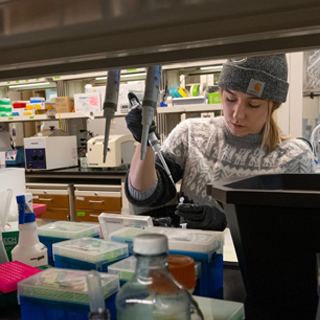EE Program Faculty
Brandon S. Cooper
Associate Professor
Contact
- Office
- ISB 308
- brandon.cooper@umontana.edu
- Office Hours
By appointment.
- Website
- http://www.cooper-lab.org/
Education
NIH and NIAID Postdoctoral Fellow, University of California-Davis, 2014-2017
PhD, Indiana University-Bloomington, 2014
Courses Taught
Current:
Global Leadership Seminar: Global Change and Human Disease Transmission, fall 2023
BIOM 420, Host-Microbe Interactions (full writing course), some springs
BIOB 595-02, Advanced Evolutionary Genetics & Genomics (CHALK) Seminar, each spring and fall
Past:
BIOB 160N, Principles of Living Systems, each fall
BIOM 491-01, Host-Microbe Interactions, spring 2019/2020
Research Interests
Host-microbe interactions, speciation, and other evolutionary genetic problems
Field of Study
Evolutionary Genetics
Population Biology
Host-Microbe Interactions
Selected Publications
Hague M.T.J., J.D. Shropshire, C.N. Caldwell, J.P. Statz, W.R. Conner, and B.S. Cooper. 2022. Temperature effects on cellular host-microbe interactions explains continent-wide endosymbiont prevalence. Current Biology. 10.1016/j.cub.2021.11.065.
Shropshire J.D., E. Hamant, W.R. Conner, and B.S. Cooper. 2022. cifB transcription largely explains cytoplasmic incompatibility variation across divergent Wolbachia. Proceedings of the National Academy of Sciences (PNAS) Nexus. 1:pgac099.
Beckmann J.F., K. Van Vaerenberghe, D.E. Akwa, and B.S. Cooper. 2021. A single mutation weakens symbiont-induced reproductive manipulation through reductions in deubiquitylation efficiency. Proceedings of the National Academy of Sciences (PNAS). 118:e2113271118.
Shropshire J.D., E. Hamant, and B.S. Cooper. 2021. Male age and Wolbachia dynamics: Investigating how fast and why bacterial densitites and cytoplasmic incompatibility strengths vary. mBio. 12:e02998-21.
Matute D.R. and B.S. Cooper. 2021. Comparative studies on speciation: 30 years since Coyne and Orr. Evolution. doi.org/10.1111/evo.14181.
Hague M.T.J., Caldwell C., and B.S. Cooper. 2020. Pervasive effects of Wolbachia on host temperature preference. mBio. 11:e01768-20
Hague M.T.J., H. Mavengere, D.R. Matute, and B.S. Cooper. 2020. Environmental and genetic contributions to imperfect wMel-like Wolbachia transmission and frequency variation. GENETICS. 215:1117-1132.
Cooper, B.S., D. Vanderpool, W.R. Conner, D.R. Matute, and M. Turelli. 2019.Wolbachia acquisition by Drosophila yakuba-clade hosts and transfer of incompatibility loci between distantly related Wolbachia. GENETICS. 212:1399-1419.
Meany, M.K., W.R. Conner, S.V. Richter, J.A. Bailey, M. Turelli, and B.S. Cooper. 2019. Loss of cytoplasmic incompatibility and minimal fecundity effects explain relatively low Wolbachia frequencies in Drosophila mauritiana. Evolution. 73-6:1278-1295. 73
Cooper, B.S., A. Sedghifar, W.T. Nash, A.A. Comeault, D.R. Matute. 2018. A maladaptive combination of traits contributes to the maintenance of a Drosophila hybrid zone. Current Biology. 28:2940-2947.
Turelli, M., B.S. Cooper, K.M. Richardson, P.S. Ginsberg, B.P. Peckenpaugh, C.X. Antelope, K.J. Kim, M.R. May, A. Abrieux, D.A. Wilson, M.J. Bronski, B.R. Moore, J. Gao, M.B. Eisen, J.C. Chiu, W.R. Conner, A.A. Hoffmann. 2018. Rapid global spread of wRi-like Wolbachia across multiple Drosophila. Current Biology. 28:963-971.
Cooper, B.S., P. Ginsberg, M. Turelli, and D. Matute. 2017. Wolbachia in the Drosophila yakuba complex: pervasive frequency variation and weak cytoplasmic incompatibility, but no apparent effect on reproductive isolation. GENETICS. 205:333–351.
Affiliations
EE
CMMB
Specialized Skills
SCIENCING
International Experience
My lab carries out field work on multiple continents, with much of our work taking place in west Africa.
Honors / Awards
National Science Foundation CAREER Award
National Institutes of Health Early State Investigator Award (R35 MIRA)
National Institutes of Health Established Investigator Award (R35 MIRA)
Hobbies
Mostly just being a dad.

